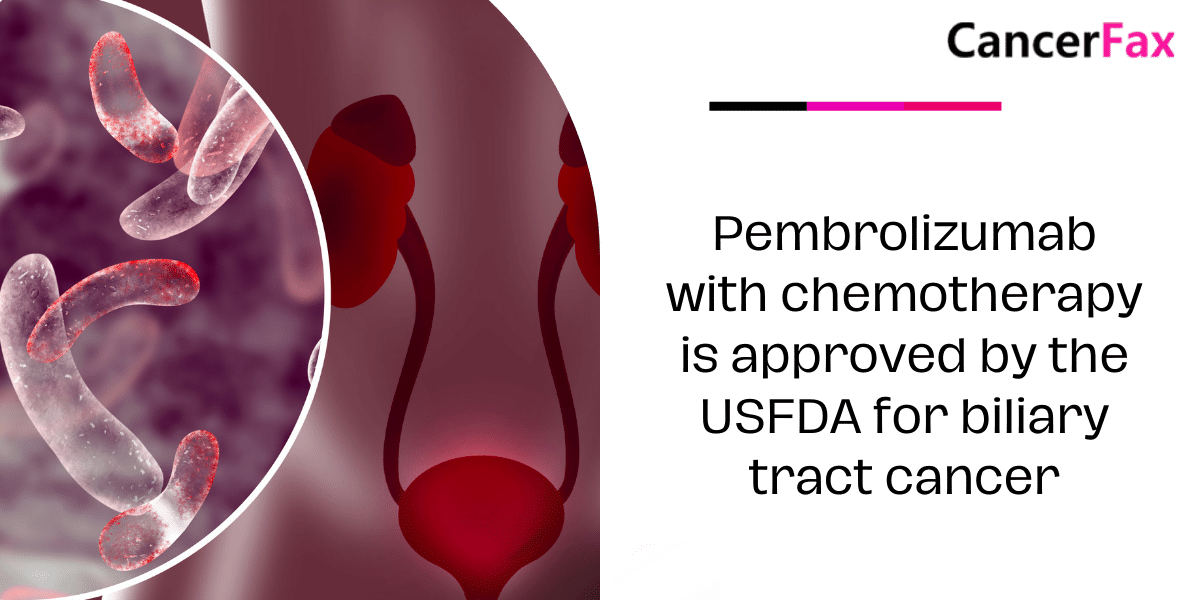Pembrolizumab with chemotherapy is approved by the USFDA for biliary tract cancer
On October 31, 2023, the Food and Drug Administration approved pembrolizumab (Keytruda, Merck) to be used with gemcitabine and cisplatin to treat biliary tract carcinoma (BTC) that has spread or is locally advanced but can not be removed.
The effectiveness was assessed in a study called KEYNOTE-966 (NCT04003636), which was a multicenter, randomized, double-blind, placebo-controlled trial involving 1069 patients with locally advanced unresectable or metastatic BTC who had not undergone previous systemic therapy for advanced illness. Patients were randomly assigned to receive either pembrolizumab in combination with gemcitabine and cisplatin every 3 weeks, or placebo in combination with gemcitabine and cisplatin on the same schedule. Treatment persisted until intolerable side effects or advancement of the disease. Cisplatin was given for up to 8 cycles, whereas gemcitabine was continued based on the physician’s judgment. The administration of Pembrolizumab or placebo was maintained until illness progression, intolerable toxicity, or a maximum duration of 2 years.
The primary effectiveness endpoint was overall survival (OS). Pembrolizumab combined with chemotherapy showed a substantial increase in overall survival compared to placebo combined with chemotherapy, with a hazard ratio of 0.83 (95% CI: 0.72, 0.95); one-sided p-value=0.0034. The median overall survival (OS) was 12.7 months with a 95% confidence interval (CI) of 11.5 to 13.6 in one group, and 10.9 months with a 95% CI of 9.9 to 11.6 in the other group.
Interruption of pembrolizumab due to adverse events happened in 55% of patients. Low neutrophil count, low platelet count, anemia, low white blood cell count, fever, tiredness, cholangitis, elevated ALT and AST, and biliary obstruction were some of the side effects or lab problems that happened so often (≥2%) that the treatment had to be stopped.
The suggested dosage of pembrolizumab is 200 mg every 3 weeks or 400 mg every 6 weeks until disease progression or intolerable toxicity. Administer pembrolizumab before chemotherapy if both are given on the same day.
View full prescribing information for Keytruda.
Susan Hau is a distinguished researcher in the field of cancer cell therapy, with a particular focus on T cell-based approaches and cancer vaccines. Her work spans several innovative treatment modalities, including CAR T-cell therapy, TIL (Tumor-Infiltrating Lymphocyte) therapy, and NK (Natural Killer) cell therapy.
Hau's expertise lies in cancer cell biology, where she has made significant contributions to understanding the complex interactions between immune cells and tumors.
Her research aims to enhance the efficacy of immunotherapies by manipulating the tumor microenvironment and exploring novel ways to activate and direct immune responses against cancer cells.
Throughout her career, Hau has collaborated with leading professors and researchers in the field of cancer treatment, both in the United States and China.
These international experiences have broadened her perspective and contributed to her innovative approach to cancer therapy development.
Hau's work is particularly focused on addressing the challenges of treating advanced and metastatic cancers. She has been involved in clinical trials evaluating the safety and efficacy of various immunotherapy approaches, including the promising Gamma Delta T cell therapy.
- Comments Closed
- March 3rd, 2024






Advanced bile duct cancer treatment, FDA-approved BTC regimen 2024, Gallbladder cancer immunotherapy, Immunochemotherapy for cholangiocarcinoma, Keytruda for biliary cancer, PD-1 inhibitor combinations, Pembrolizumab BTC approval, Precision oncology for GI cancers
CancerFax is the most trusted online platform dedicated to connecting individuals facing advanced-stage cancer with groundbreaking cell therapies.
Send your medical reports and get a free analysis.
🌟 Join us in the fight against cancer! 🌟
Привет,
CancerFax — это самая надежная онлайн-платформа, призванная предоставить людям, столкнувшимся с раком на поздних стадиях, доступ к революционным клеточным методам лечения.
Отправьте свои медицинские заключения и получите бесплатный анализ.
🌟 Присоединяйтесь к нам в борьбе с раком! 🌟